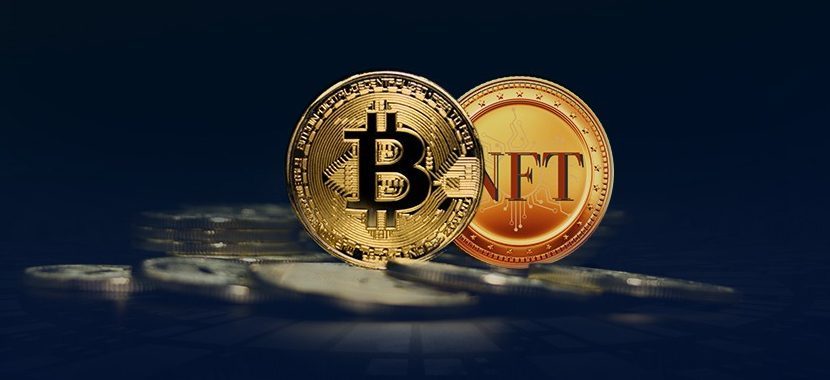The cryptocurrency world is constantly evolving, and new innovations are emerging regularly. One of the latest developments to make waves in the digital asset world is non-fungible tokens (NFTs). NFTs are unique digital assets designed to represent ownership of a particular item or content. The rise of NFTs has had a significant impact on the Bitcoin market, and in this article, we will explore the implications of this new trend.
What Are NFTs?
Before we dive into the impact of NFTs on the Bitcoin market, it is essential to understand what NFTs are and how they work. As mentioned earlier, NFTs are unique digital assets that represent ownership of a particular item or piece of content. These items range from digital art to music, videos, and tweets.
NFTs are built on blockchain technology, meaning they are decentralized and exist on a distributed ledger. This technology ensures that NFTs are secure and cannot be tampered with, making them an attractive investment option for many investors.
The Rise of NFTs
The rise of NFTs can be traced back to 2017, when CryptoKitties, a blockchain-based game that allowed players to breed and trade virtual cats, became popular. This game introduced the concept of NFTs and demonstrated the potential of digital assets built on blockchain technology.
Since then, NFTs have exploded in popularity, and their market value has skyrocketed. In 2021 alone, the NFT market reached a record-breaking $2.5 billion in sales, compared to just $13.7 million in 2018. This surge in popularity has been driven by the increasing interest in digital assets and the growing use of blockchain technology.
The Impact of NFTs on the Bitcoin Market
The rise of NFTs has had a significant impact on the Bitcoin market. Here are some of the ways that NFTs are affecting the Bitcoin market:
Increased Demand for Crypto
One of the most significant impacts of NFTs on the Bitcoin market is the increased demand for cryptocurrency. NFTs are built on blockchain technology, meaning they can only be purchased using cryptocurrencies such as Bitcoin and Ethereum. As a result, the growing popularity of NFTs has led to increased demand for cryptocurrencies, driving up their prices.
This increased demand for cryptocurrencies has positively impacted the Bitcoin market, as more people are investing in cryptocurrencies due to the popularity of NFTs.
Increased Adoption of Blockchain Technology
The popularity of NFTs has also led to increased adoption of blockchain technology. NFTs are built on blockchain technology, and their success has demonstrated the potential of this technology for various applications beyond cryptocurrency.
As more people become familiar with blockchain technology through NFTs, it is likely to be adopted for other purposes. This increased adoption of blockchain technology will likely positively impact the Bitcoin market, as it will drive further innovation and investment in the space.
Potential for Increased Liquidity
NFTs have the potential to increase liquidity in the Bitcoin market. Liquidity refers to buying or selling an asset quickly and easily without affecting its price. In the case of Bitcoin, liquidity has been a significant issue, as it can be challenging to sell large amounts of Bitcoin without affecting its price.
However, NFTs can potentially change this by creating new markets for Bitcoin. NFTs are unique digital assets, and their popularity has created a new market. As a result, investors who own Bitcoin can now sell it for NFTs, which can then be sold for fiat currency or other cryptocurrencies. This new market for Bitcoin could potentially increase liquidity in the Bitcoin market, making it easier for investors to buy and sell Bitcoin without affecting its price.
Increased Interest in Digital Assets
The popularity of NFTs has also led to increased interest in digital assets. NFTs have demonstrated that digital assets have value and can be traded like traditional assets. This has led to more people investing in digital assets, including Bitcoin.
As more people invest in digital assets, there is an increased demand for cryptocurrencies like Bitcoin. This increased demand positively impacts the Bitcoin market, driving up its price and increasing the number of investors in the space.
Challenges Faced by NFTs on the Bitcoin Market
While NFTs have significantly impacted the Bitcoin market, they also face several challenges that could affect their long-term success. Some of these challenges include:
Lack of Standardization
One of the biggest challenges facing NFTs is the lack of standardization in the market. There is currently no standard for NFTs, meaning they can vary significantly in value, ownership, and functionality. This lack of standardization makes it challenging for investors to evaluate NFTs and can lead to confusion and uncertainty in the market.
High Energy Consumption
Another challenge facing NFTs is their high energy consumption. NFTs are built on blockchain technology, which requires a significant amount of energy to operate. This high energy consumption has raised concerns about the environmental impact of NFTs and could lead to increased market regulation.
Market Volatility
Finally, the NFT market is highly volatile, with prices fluctuating rapidly. This volatility can make it challenging for investors to determine the value of NFTs and can lead to significant losses if prices suddenly drop.
Conclusion
NFTs have significantly impacted the Bitcoin market, driving up demand for cryptocurrencies and increasing interest in digital assets. The popularity of NFTs has also led to increased adoption of blockchain technology, which could positively impact the Bitcoin market in the long term.
However, NFTs face several challenges, including a lack of standardization, high energy consumption, and market volatility. These challenges could affect the long-term success of NFTs and the Bitcoin market.
Overall, the impact of NFTs on the Bitcoin market is complex and multifaceted, and it will be interesting to see how these digital assets continue to evolve in the coming years.
